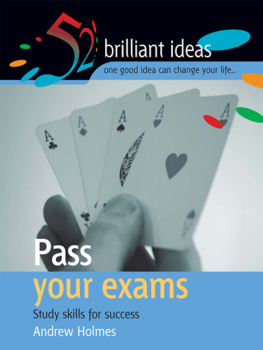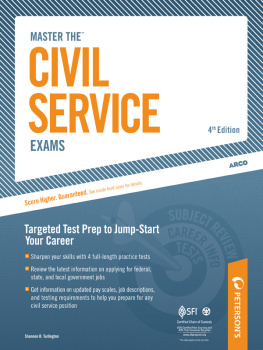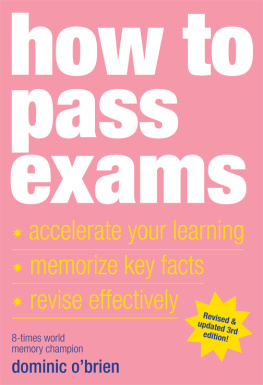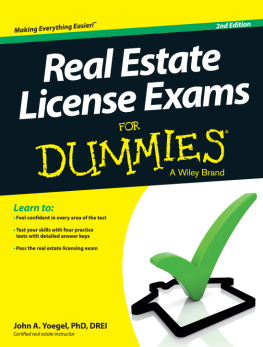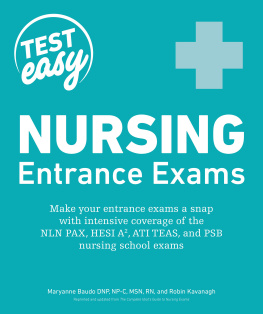Breeze through your exams
Tips and techniques to pass the test
Infinite Ideas

8. Less snakes, more ladders
If studying and exams were a game of snakes and ladders, wouldnt you want to have more ladders than snakes? In the world of study, exam briefings are there to be climbed whereas bunking off can only bring you down.
Most institutions, be they schools, universities or cookery clubs, want as many of their students to pass as possible. In fact, theyll hold exam briefings to give as many hints and tips to their students as possible. Shouldnt you attend?
One of the simplest errors students of any kind can make is to fail to attend an exam briefing session. Such sessions are invaluable because they help you to get to grips with the trials ahead, namely the dreaded exams. Most are run a few weeks before the exams start so that everyone has the opportunity to complete their revision in time, even for those of us who leave most of it to the last minute. So, having attended one of these sessions, what should you do with all that invaluable information? Try the following:
- First, compare what you have just heard to your existing plan of action. And if you didnt have a plan you should now be armed with everything you need to create one. If there is anything that you havent already covered or something that you now feel requires a little more work, adjust your revision timetable to take account of it.
- If you have been given some broad tips on what some, or perhaps all, of the questions might be, its a good idea to consider narrowing your revision a bit so that you can spend more time on those subjects. It will also be worthwhile reading around the selected topics for background information, and checking a few past papers to get a gist of what the examiners are looking for.
- Finally, take some time to review how your current revision approach will allow you to maximize your marks whilst minimizing your workload. Its a case of working smarter, not harder. The tips you will get about marking, for example, should guide you towards better time management.
The next time an exam review session is announced for your class, make sure you attend. When you are there listen attentively and take as many notes as possible. These events are golden opportunities for you to improve your chances of being successful in your exams and gold is the color of success.
9. Tick, tock
Managing time is a skill which every student has to master. From developing a study timetable to making sure you spend your time effectively in the exam hall, every second counts.
Its ironic, isnt it? We talk about time management and yet we are no more capable of truly managing time than we are of holding back the tide.
The great news is that if you can get good at using time productively then you can reduce the number of hours you have to spend poring over books, notes and papers. So what do the masters of time management suggest? First, you have to know what saps your time. The key time wasters associated with studying are:
- Interruptions of any kind.
- Crisis management, or in other words, leaving everything to the last minute (yes, crammers, its you were talking about).
- Unclear objectives and priorities.
- Having no plan.
- Stress and tiredness.
- Personal organization (you will have to tidy your desk and room, as otherwise how are you going to find your notes when you need them?).
If any of these affect you, its time you got clockwise and understood the value of time management.
Try these time tips:
- Tackle the most difficult areas of study and revision first. Sure, its easy to procrastinate and do the easy stuff before anything else, but you are better off focusing on the tough material first as the longer you leave it, the more difficult it gets to face up to. Then youll never get around to it, youll get stressed out and things will go on a downward spiral.
- Prioritize your time. Dont try to do all your revision in one go: assess what needs to be done and then determine what order you are going to tackle it in.
- Avoid any form of distraction. Unplug the internet and turn off your precious mobile phone.
- If you are going to work with others make sure you set yourselves objectives. Otherwise you may well have a great time, but youll achieve nothing.
- If you are studying alongside a day job and family, make sure you allocate your time carefully. Your spouse and children do want to see you, you know.
- Make a plan. If you stick to your plan you will be just fine.
Analysing how you spend you time during your study periods by jotting down what you do over the course of a week or so can help, too. Youll be surprised at just how unfocused you are.
Time management also comes into the exam itself and, if anything, is far more important then. Not having completed the paper before you hear those immortal words Put your pens down is a heart-stopping experience, often closely preceded by the blind panic of trying to complete the final question in less than 30 seconds. So to avoid that seizure moment, make sure you know exactly how much time you have got for each question and stick to it. You may not completely finish every question, but you will get more marks than if you only completed two out of three.
Make a list of all your exam dates as soon as they become available. Once you are armed with this information, work backwards a few weeks until you believe you have arrived at a date when you intend to start you revision. Now set yourself weekly and then daily targets of what you are expecting to have achieved. And, as you get nearer the exams themselves, prioritize where to focus your efforts.
10. Spotting the winners
If youre struggling with the amount of revision youve got to do, why not try something completely different? Its time to cut to the chase and get your binoculars out. Yes, its time to go question spotting.
Focusing on a few key topics might seem like a high-risk strategy, but what better way to concentrate your revision? Study them well and youll be successful. The art, of course, is figuring out which ones to study.
So youve been sweating hard poring over the syllabus and thinking to yourself, How on Earth am I going to learn all this stuff? Well the simple answer is, you dont have to. Question spotting is an incredibly simple exam technique: all it entails is working out the questions that might appear on your exam paper and then revising only those topics. There are some immediate advantagesfocused revision and an opportunity to augment your answers with information from other sources.
Question spotting is part art and part science. The art comes from the application of judgement and the willingness to take a few risks when it comes to focusing your study. The science well, pseudo-science really comes from deducing the best topic areas to focus on. If the idea of question spotting appeals to you, then its best to start on a subject that you feel most comfortable with and attempt a dry run. Another approach to help you hone your question-spotting skills is to use past papers from subjects that you are not studying: after all, patterns are patterns, and you can develop your expertise without worrying about messing up. Once you are confident, you can begin to apply the approach to the subjects you are studying. You can always test your question-spotting skills by holding one past paper back and trying to predict the questions on it from what you have just learnt. Another dead cert for the question spotter is when the syllabus changes. You can almost guarantee that the examiners will set a question on the new topics they introduce otherwise, why would they bother introducing them in the first place?
Next page








